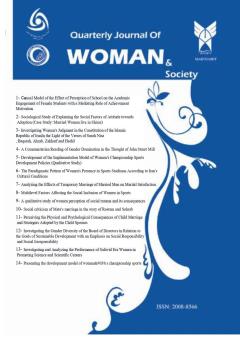Studying the Effects of Women's Believes in Gender Segregation in Housework and Jobs on Their Roles in Urban Development
Subject Areas :Fatemeh Farahani 1 , Ali Roshanaie 2 * , Mohammad Hossein Asadi Davoodabadi 3 , Omid Ali Ahmadi 4
1 - Economic and Development Sociology Ph.D student, Faculty of Humanities, Ashtian Branch, Islamic Azad University, Ashtian, Iran.
2 - Assistant Professor of Sociology Department, Faculty of Humanities, Ashtian Branch, Islamic Azad University, Ashtian, Iran. (Advisor)
3 - Assistant Professor of Sociology Department, Ash.c. Islamic Azad University, Ashtian, Iran
4 - Sociology. Faculty of Social Sciences. Islamic Azad university. Reconciliation Iran
Keywords: Gender Segregation of Roles, Feeling of Gender Discrimination, Women, Urban Development,
Abstract :
Introduction: The main purpose of the present research is to study the effects of women's belief in gender segregation in housework and jobs on their role-playing in urban development. The theoretical framework of the research is a combination of various theories by Goffman, Judith Butler, Sandra Baum, the glass ceiling theory and the school of feminism. Methods: This is a survey research conducted using a researcher-made questionnaire administered among women over 20 years old in Arak, Iran. Using a combination of cluster sampling and disproportionate classification, the sample size was 392 individuals. Findings: The results showed that the higher in value the variables of gender segregation in housework, belief in gender segregation in jobs and the feeling of gender discrimination, the lower is the role of women in urban development at a confidence level higher than 95%. The results showed that the three independent variables "the extent of gender segregation in housework", "belief in gender segregation in the development jobs" and "the feeling of gender discrimination" explain about 21% of the variance of the variable "women's role-playing in the sustainable urban development. Conclusion:Using the women's capacities in the social roles, especially roles related to urban development, requires the modification of attitudes, both in family affairs and social and occupational roles. Removing cultural barriers to women's entry into urban development, especially patriarchal culture, changing and removing gender stereotypes about the different roles of women and men, is an important ground to empower women.
1. Carr ER. Men's crops and women's crops: the importance of gender to the Understanding of agricultural and development outcomes in Ghana's central region. World DevT. 2008; 36(5): 900-915. [Link]
2. Warner ME. Social Capital Construction and the role of the Local. Rural Sociology. 1999; 64(3): 373-393. [Link]
3. Majedi M, Andalib AR, Mosharzadeh Mehrabi Z. Identifying Effective Factors of Women’s Participation in Urban Development Projects. Bagh-e Nazar; 2015; 12(362): 3-12. [Link]
4. Moosavi NS. Developing a Framework for Measuring Social Capacity of Urban Infill Development (Case Study: Rudaki District of Arak). Journal of Geography and Environmental Studies. 2018; 7(27): 25-42. [Link]
5. Pelling M, O'Brien K, Matyas D. Adaptation and transformation. Clim Change. 2015; 133(1): 113-127. [Link]
6. Quisumbing AR, Malapit HJ. What dimensions of women’s empowerment in agriculture matter for nutrition in Ghana? Food Policy. 2015; 52: 54-63. [Link]
7. Diiro GM, Seymour G, Kassie M, Muricho G, Muriithi BW. Women’s empowerment in agriculture and agricultural productivity: Evidence from rural maize farmer households in western Kenya. Plos One. 2018; 13(5): 1-27. [Link]
8. Crisp BR, Swerissen H, Stephen J. Duckett Four approaches to capacity building in health: Consequences for measurement and accountability. Health Promot Int. 2000; 15(2): 99-107. [Link]

